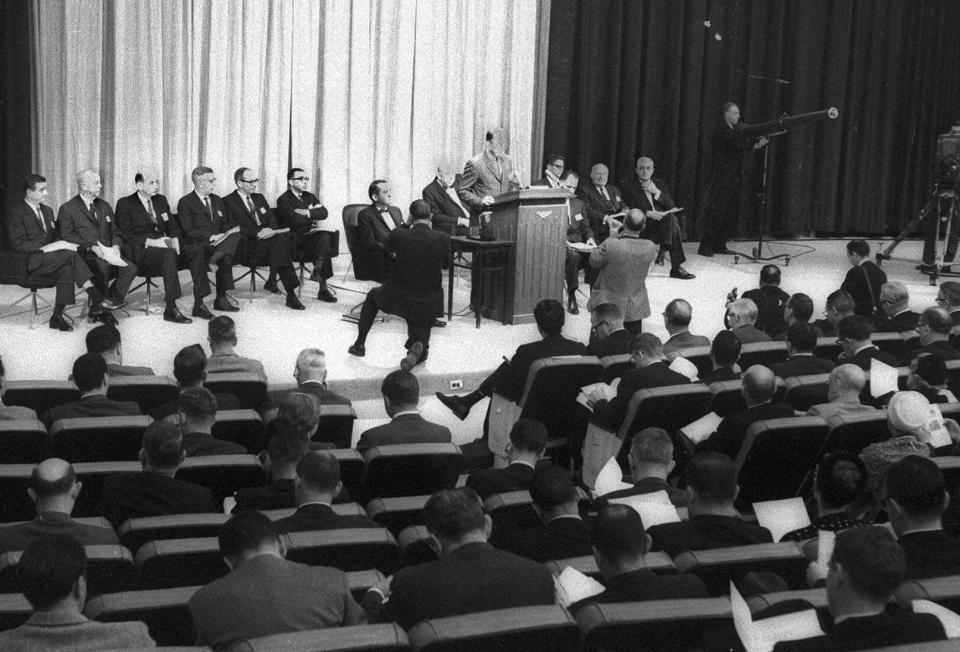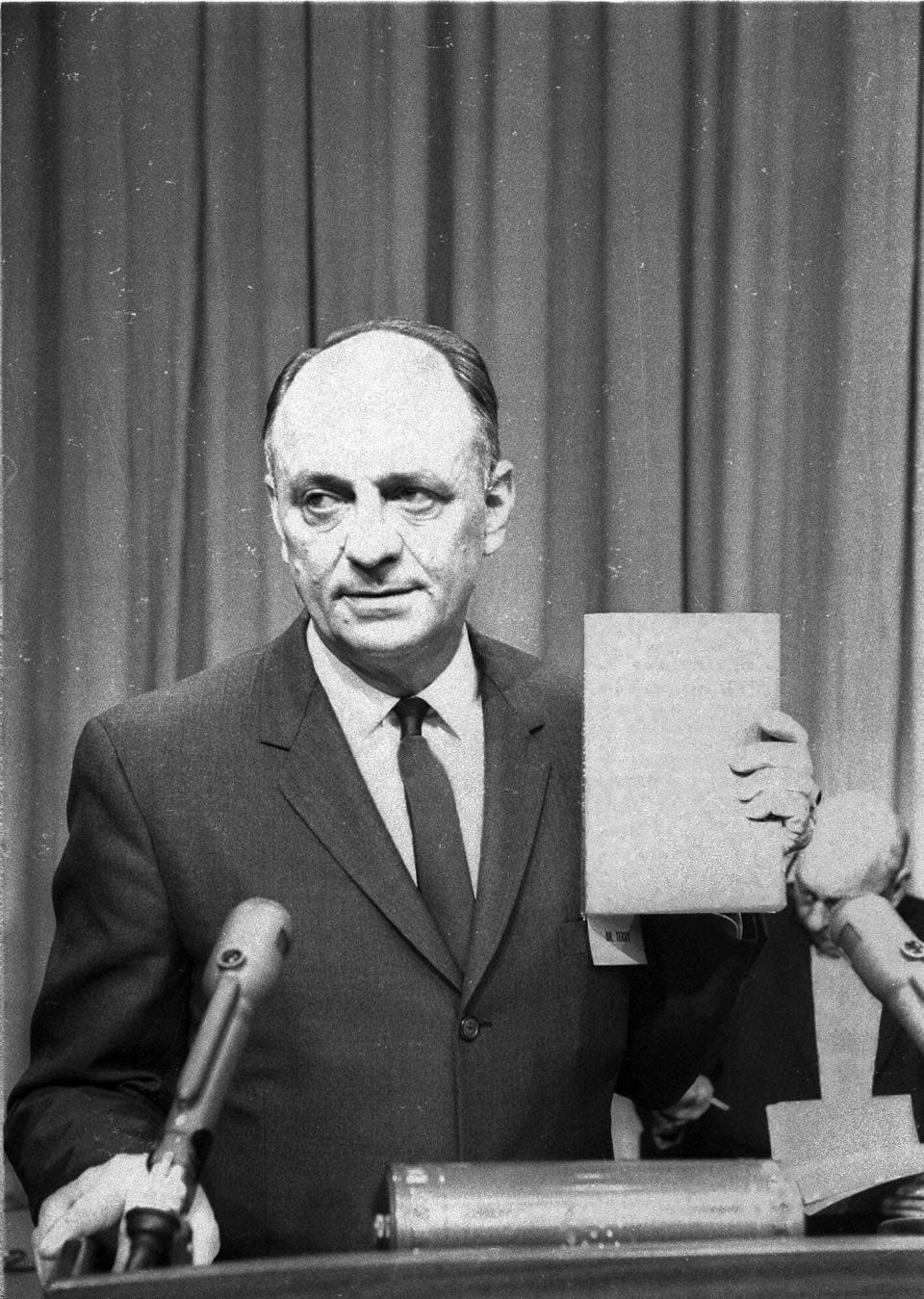AP WAS THERE: '64 US report ties smoking to cancer
WASHINGTON (AP) — EDITOR'S NOTE — On Jan. 11, 1964, AP Science Writer Frank Carey covered the release of U.S. Surgeon General Luther Terry's historic report linking cigarette smoking to lung cancer. The report has been called one of the most important documents in U.S. public health history. While not the first to raise the alarm about smoking, it gave momentum to the push for tobacco controls. The surgeon general has periodically issued more smoking reports, and a new one is due out next week. Fifty years after its original publication, the AP is making this story available to its subscribers.
___
WASHINGTON (AP) — Heavy cigarette smoking is the principal cause of cancer of the lungs and the larynx and a health hazard so grave as to call for remedial action, a blue-ribbon science panel concluded today.
The nature of that action was not spelled out. However, Surgeon General Luther Terry of the U.S. Public Health Service said his agency will move promptly to recommend specific steps of the kind urged by the science group. Meanwhile, he told a news conference: "I would advise anyone to discontinue smoking cigarettes."
The 10-man special advisory committee on smoking and health took 14 months to evaluate more than 8,000 studies of the effect of smoking on health.
It undertook no fresh research but decided available evidence shows that cigarette smoking far outweighs all other causes of lung cancer and cancer of the larynx — in men and perhaps in women.
It had no such clear-cut indictment of cigarette smoking in the area of heart and blood vessel disease or lesser aliments sometimes associated with smoking.
But, broadly, the panel took the view that the more you smoke the more you risk early death.
The special group was not requested to make specific recommendations for laws or regulations to offset smoking hazards but it concluded: "Cigarette smoking is a health hazard of sufficient importance in the United States to warrant appropriate remedial action."
After releasing the report, Terry declared that there will be "no footdragging" in seeking possible remedial steps.
In another major conclusion the committee of scientists said: "In view of the continuing and mounting evidence from many sources, it is the judgment of the committee that cigarette smoking contributes substantially to mortality from certain specific diseases and to the over-all death rate. "
The report, which ran to about 150,000 words and several hundred pages, hit hardest at cigarette smoking as being what it termed a significant cause of lung cancer, chronic bronchitis, and cancer of the larynx, or voice box. The committee was more reserved in linking cigarette smoking with heart disease and circulatory disorders, at least as to any cause-and-effect relationship.
The report said in this respect: "Male cigarette smokers have a higher death rate from coronary artery disease than non-smoking males, but it is not clear that the association has causal significance." But it said also that an association has been established between cigarette smoking in men and higher rates of coronary disease, and it asserted: "It is . more prudent to assume that the established association between cigarette smoking and coronary disease has a causative meaning than to suspend judgment until no uncertainty remains." As for lung cancer, the report said that in men, cigarette smoking far outweighs other possible causes of the malady and "the data for women, though less extensive, point in the same direction."
" It said the risk of developing lung cancer for pipe smokers and cigarette smokers is greater than for nonsmokers "but much less than for cigarette smokers." For various specific diseases, Terry said in a statement, the committee's findings were that cigar and pipe smoking have little significance in comparison with cigarettes.
But while it found much physical menace in smoking, the committee reported that there are benefits in the area of mental health and ease, saying "the habit originates in a search for contentment."
As regards other diseases, the box score of the report ran this way:
1. Cancer of the esophagus — there is evidence of an association with smoking, but cause and effect have not been decided on the basis of present evidence.
2. Cancer of the urinary bladder — an association with cigarette smoking but not enough evidence to establish a cause-and-effect link.
3. Stomach cancer_no relationship established.
4. Peptic ulcer (including ulcers of the stomach and of the duodenum which links the stomach with the intestines)_an association with cigarette smoking but no cause and effect yet established.
5. Amblyopia, dimness of vision unexplained by any bodily defect — an apparent relationship between this ailment and pipe and cigar smoking — but no cause-and-effect link yet made.
6. Cirrhosis of the liver: — there is increased mortality from this among smokers, but the evidence is not sufficient to establish the cause and effect link.
7. Infant birth weight — women who smoke cigarettes during pregnancy tend to have babies of lower than usual birth weight. But Information is lacking on the mechanism by which this decrease in birth rate is produced.
The report said that available evidence suggests the existence of some constitutional differences between smokers and nonsmokers but it is still too meager to permit a conclusion.
As to mortality among cigarette smokers the report declared that one study has shown that the death rate for smokers of cigarettes only is about 70 percent higher than that for nonsmokers, and it added: "The death rates increase with the amount smoked."
The report said that in most parts of the nation cigarette smoking contributes to chronic lung and bronchial ailments much more than does air pollution.
Terry told newsmen who were given an hour and a half to study the report before its release that it "has provided us with the most comprehensive compilation and analysis ever undertaken on the relationship between smoking and health."
"You will have noted," Terry said, "that the committee's report does not cover what 'appropriate remedial action' might be. It was not a part of the responsibility of this committee to make such recommendations." But Terry added: "I can assure the committee that we will move promptly to determine what remedial health measures the public health service should take. Secretary (of welfare) Celebreeze has asked me to analyze the report and make recommendations to him.
"The staff of the public health service is only now receiving the report and I shall, of course, want their views before making our recommendations. I am sure that other departments and agencies of the federal government, along with non-federal agencies, will also take the report under consideration promptly."
Asked whether the committee's report could now be considered to represent the government's official thinking on the subject of smoking and health, Terry replied that it could not. But he added: "On the other hand, having had the opportunity to go over it, I can assure you it is an excellent report."
Asked when government action of any kind would be taken on the report, Terry replied: "It would be inappropriate for me to try to say when ... but in our (Public Health Service) department this matter is considered of such importance that I do not believe there will be any foot-dragging."
In saying that on the basis of the committee's findings he as a doctor would recommend against smoking, Terry said that "in the light of a clear-cut association" between smoking and lung cancer as found by the committee, he would say that If anyone continued to smoke "he should do it with a recognition that he is subjecting himself to a definite health risk."
The surgeon general said copies of the report are being sent to members of congress. "And to the heads of other federal agencies who have an interest in the findings and conclusions." He added that copies are also being mailed to the governors of the states, the state health offices, voluntary health agencies, representatives of industry and labor, and others concerned. And within the next few weeks, he said, the report will be sent to every physician and osteopath in the country.
In another of its major findings the document said: "Cigarette smoking is associated with a 70 percent increase in the age-specific death rates of males and to a lesser extent to increased death rates of females.
"The total number of excess deaths casually related to cigarette smoking in the U.S. population cannot be accurately estimated." As regards the illnesses in which it declared cigarette smoking was a particular hazard, the report put it this way:
Lung cancer — "Cigarette smoking is casually related to lung cancer in men; the magnitude of the effect of cigarette smoking far outweighs all other factors. The data for women, though less extensive, point in the same direction.
"The risk of developing lung cancer increases with duration of smoking and the number of cigarettes smoked per day, and is disminished by discontinuing smoking.
"In comparison with non-smokers, average male smokers of cigarettes have approximately a 9-to-10-fold risk of developing lung cancer and heavy smokers at least a 20-fold risk." Chronic bronchitis and pulmonary emphysema (an enlargement of the air sacs of the lungs which may make breathing difficult and possibly bring on heart failure) — "Cigarette smoking is the most important of the causes of chronic bronchitis in the United States and increases the risk of dying from chronic bronchitis and emphysema.
"A relationship exists between cigarette smoking and emphysema but it has not been established that the relationship is causal. Studies demonstrate that fatalities from this disease are infrequent among non-smokers." The committee said cigarette smoking "does not appear to cause asthma." And it added: "Although death certification shows that cigarette smokers have a moderately increased risk of death from influenza and pneumonia, an association of cigarette smoking and infectious diseases is not otherwise substantiated."
Speaking on the subject of "the tobacco habit and nicotine" the panel reported: "The habitual use of tobacco is related primarily to psychological and social drives, reinforced and perpetuated by pharmacological (drug) actions of nicotine.
"Social stimulation appears to play a major role in a young person's early and first experiments with smoking. No scientific evidence supports the popular hypothesis that smoking among adolescents is an expression of rebellion against authority."
Then the report added: "Individual stress appears to be associated more with fluctuations in the amount of smoking than with the prevalence of smoking. The overwhelming evidence indicates that smoking — its beginning, habituation, and occasional discontinuation — is to a very large extent psychologically and socially determined."
The committee said: "In general, the greater the number of cigarettes smoked daily, the higher the death rate (from all causes). "For men who smoke fewer than 10 cigarettes a day, according to the seven prospective studies, the death rate from all causes is about 40 percent higher than for non-smokers.
"For those who smoke from 10 to 19 cigarettes a day it is about 70 percent higher than for non-smokers; for those who smoke 20 to 39 a day, 90 percent higher; and for those who smoke 40 or more, it is 120 percent higher.
"Cigarette smokers who stopped smoking before enrolling in the seven studies have a death rate about 40 percent higher than non-smokers, as against 70 percent higher than for current cigarette smokers. Men who began smoking before age 20 have substantially higher death rate than those who began after 25 ... "
Of smokers' personality it said: "A clear-cut smoker's personality has not emerged from the results so far published. "While smokers differ from non-smokers in a variety of characteristics, none of the studies has shown a single variable which is shown solely in one group and is completely absent in another. Nor has any single variable been verified in a sufficiently large proportion of smokers and in sufficiently few non-smokers to consider it an 'essential' aspect of smoking."


